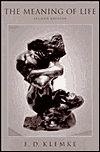|
PHILOSOPHY

The Meaning of Life
ed. by E.D. Klemke
ISBN: 019512703X
A great anthology of essays that attempt to tackle one of the
"great questions" that has faced man since his arrival on Earth; what is the
meaning of life--why are we here ?
Professor Klemke, presents us with three avenues of explanation;
God as an answer; a non-theistic answer; and questioning the crux of the
question itself. Essays by Tolstoy, Reinhold Neibuhr and David Swenson
present God as the answer to man's existence and purpose.
Whereas Bertrand Russell, Huxley, Camus, Thomas Nagel, Paul
Edwards, Richard Taylor, Kurt Baier, and Klemke pose alternatives that span
existentialism, rationalism, humanism, each arriving at a nontheistic
alternative.
In the final group of essays by Kai Nielsen, Paul Edwards, R.M.
Hare, and W.D. Joske, they each examine the nature of the question
itself: is the question a legitimate one ?
A truly excellent compilation of essays that are sure to
engage you.
"On the highly particularized problems of giving meaning to an
individual life, philosophy may not have much to say: but it is certainly
concerned with what seems to be general threats to meaningfulness arising out
of the human situation as such. For the non theist, the chief
threat may well appear to come from the realization of mortality. The
relation between meaning and mortality is, as we have noted, a focus of
attention in current discussions. On the other side are writers (Tolstoy
is again among them--as Flew brings out) who in some contexts virtually
identify the question of meaningfulness with the question of immortality: deny
immortality and you necessarily deny meaningfulness. This account
plainly distorts the logic of the question about the meaning of life, not
least by reducing its complexity to a single issue of fact." (R.W. Hepburn, p.
217)
"If we see people as naked apes, we cannot but be cynical
concerning the superstructure of justification associated with many of the
most memorable human enterprises. Once we accept that many of our
political and military endeavors are the working out of a primitive instinct
of territoriality, we can no longer regard as fully meaningful the gloss of
reasoning and argument which men use in an attempt to show that their
undertakings are reasonable. The words of debate become mere persiflage;
the talk a mere epiphenomenon of creatures ignorant of the true springs of
their actions. We begin to undermine our faith in the capacity of human
beings to know the truth, discover what causes what, and learn, through
self-examination, about the integrity of their own motives." (W.D. Joske p.
257)
***

Walden / Civil
Disobedience
by: Henry David Thoreau
ISBN: 0395051134
"I have never felt lonesome, or in the least oppressed by a
sense of solitude, but once, and that was a few weeks after I came to the woods,
when for an hour, I doubted if the near neighborhood of man was not essential to
a serene and healthy life... I never found the companion that was so
companionable as solitude... What everybody echoes or in silence passes by
as true today may turn out to be falsehood tomorrow... What a man thinks of
himself, that it is which determines, or rather indicates, his fate... The mass
of men live lives of quiet desperation...things do not change, we
change... However mean your life is, meet it and live it; do not shun it
and call it hard names... it looks poorest when you are richest. The fault
finder will find faults even in paradise. Love your life, poor as it
is." from Walden
"The only obligation which I have a right to assume is to do at
any time what I think right... a corporation has no conscience; but a
corporation of conscientious men is a corporation with a conscience...
Unjust laws exist: shall we be content to obey them, or shall we endeavor to
amend them, until we have succeeded, or shall we transgress them at once
?"
from Civil Disobedience
Walden reflects a two year period spent in the woods of Walden
Pond in Concord Massachusetts, an area preserved in Thoreau's memory
to this day. Thoreau's writing is biographical. A graduate of
Harvard who communed with nature and in like manner came to discover his true
self by exploring thoughts on topics related to the
individual's role in society. Although Civil Disobedience is an important
essay, his subsequent 'Resistance to Civil Government' warrants
closer study. This subsequent essay influenced Gandhi and Martin Luther
King Jr. by winning them over to a strategy of non-violent civil
disobedience as the path to changing unjust laws.
***
Last Updated August 17, 2005
URL:
www.thecitizenfsr.org
SM
2000-2011
You are here: HOME page-BOOKS-PHILOSOPHY
Previous : JOURNALISM Next : POETRY
|